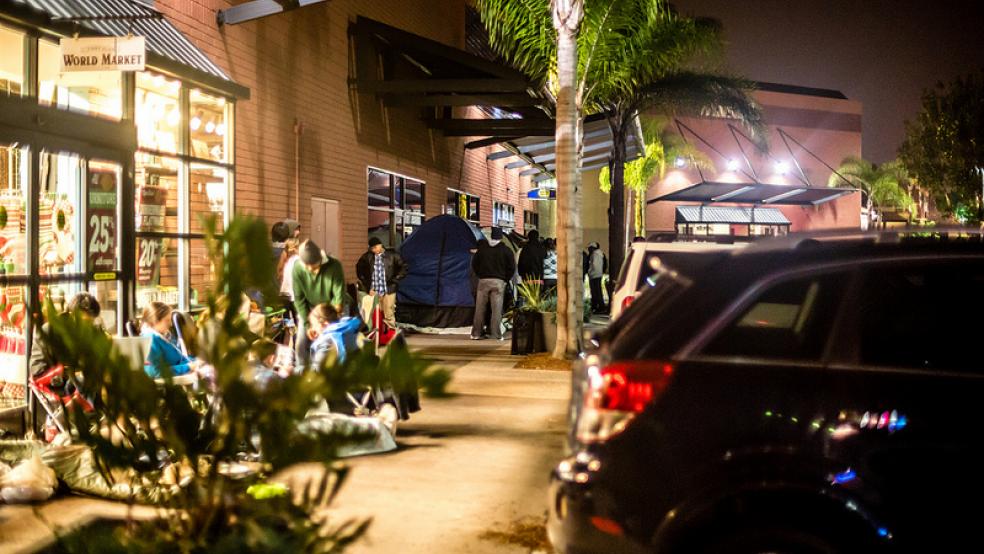Black Friday has become a frenzied ritual for millions of American shoppers, but consumers who get the best deals know that to get the best deals, you’ve got to have a game plan.
Savvy shoppers also know the rules have changed this year, as online retailers are wielding greater influence (and better sales) and brick-and-mortar stores starting their Black Friday deals days before Thanksgiving. If you plan on braving the mobs on one of the busiest shopping days all year, follow these steps:
Related: The 10 Worst Things to Buy on Black Friday
1) Plan ahead. Consumers can find out days or weeks in advance what deals their favorite stores are offering. Unlike in years past, where shoppers had to dig around online for leaks, many retailers will (if they haven’t already) publicly announce their Thanksgiving door-busters, leaving little to no surprises for consumers. “The mystery is gone, but I think that’s a good thing for shoppers,” says Dan de Grandpre, chief executive of Dealnews.com.
To strategize, check sites like BlackFriday.com/flyers to download circulars from your favorite stores.
2) Check your inbox. Retailers often send out special deals and coupons to customers who have signed up to receive email alerts. If you’ve switched over to the new gmail, however, you may not receive the messages. Be sure to check your “promotions” tab, or disable the new functionality ahead of the holidays.
3) Start shopping before Thanksgiving. According to an online survey by Accenture, 38 percent of consumers plan to shop on “Gray Thursday,” as more stores shift their holiday sales a day ahead of the traditional 5 a.m. starting mark. Walmart, the world’s largest retailer, is pushing the movement, offering its in-store deals at 6 p.m. local time on Thanksgiving Day, two hours earlier than last year.
Competition for early-bird shoppers from other major retailers, including Macy's, J.C. Penney Co., and Kohl's — all opening for the first time on Thanksgiving evening — could mean big savings for shoppers. “The earlier you shop, the better if you want great deals,” says Jeff Goldstein, president of PriceGrabber.com. Dealnews.com has a great roundup of store hours on Thanksgiving and Black Friday.
4) Tap those apps. Think of your handheld as your best friend during the holiday shopping season. Among the best: RedLaser (free; iPhone, Android, Windows Phone), which turns your camera into a barcode scanner. Simply ring up the item to see prices from stores nearby and website competitors, along with product descriptions and reviews.
Stay organized by entering your shopping list into an app like Santa’s Bag (free; iPhone) or Free Christmas List (free; Android), both of which let users store information (e.g., price range or clothing size) on gifts for each person on their list.
Many major retailers also offer their own apps, where they give exclusive holiday offers. Some store apps, like Target’s, provide in-store maps, allowing for easier navigation and in turn less time scanning the shelves.
Related: Holiday Hiring More Ho-Hum Than Ho-Ho-Ho
You’ll also want to keep an eye on your favorite retailers’ sites while you’re out and about. Online prices during Black Friday tend to drop throughout the day, meaning brick-and-mortar store shoppers “can score multiple deals simultaneously” by buying items on their smartphone while in line at the checkout, says de Grandpre.
5) Price-match; it can save you a lot. With retailers terrified of losing your business during what’s shaping up to be an uncertain holiday season, more retailers are offering or expanding their price-matching policies to include not only brick-and-mortar stores but also online competitors.
Some credit card companies also offer price-matching guarantees that can protect you if you purchase an item that drops in price alter in the season. MasterCard, Discover and Citibank all have price-protection policies, according to NerdWallet.
6) Decline (most) store-brand credit cards. Retailers often try signing up consumers for a store-brand credit card at the register. Be wary: Most of these cards carry extremely high interest rates, and opening a new card could be detrimental to your credit score.
The exception: If the card is associated with a store that you frequent often, it may still be a good deal to get the branded card. However, don’t do so if you can’t pay off the balance right away, or if you’re applying for a home or car loan in the next few months.
Related: Cautious Consumers May Make for Ho-Ho-Hum Holiday Sales
7) Keep a clear head. Beware of what April Lane Benson, author of To Buy or Not to Buy: Why We Overshop and How to Stop, calls the “herd mentality.”
In a frenzied environment, surrounded by other hungry holiday shoppers, your instinct might be to overspend. “It's so easy to lose your focus and forget what you came for,” Benson says. Review your mobile shopping list before making a purchase.
A limited supply of popular items also traps many shoppers. “When you fear something will run out, it activates a physical response that weakens your logical thinking, making you a lot more susceptible to making impulse purchases,” says Kit Yarrow, a professor of psychology at Golden Gate University in San Francisco, who studies consumer trends and behaviors. If you’re not 100 percent sure about a purchase, check its return policy to make certain you’re not stuck with shoppers’ remorse in early December.
Above all, stay focused, use good judgment -- and develop a game plan before hitting the stores this Thanksgiving.
Top Reads at The Fiscal Times:




